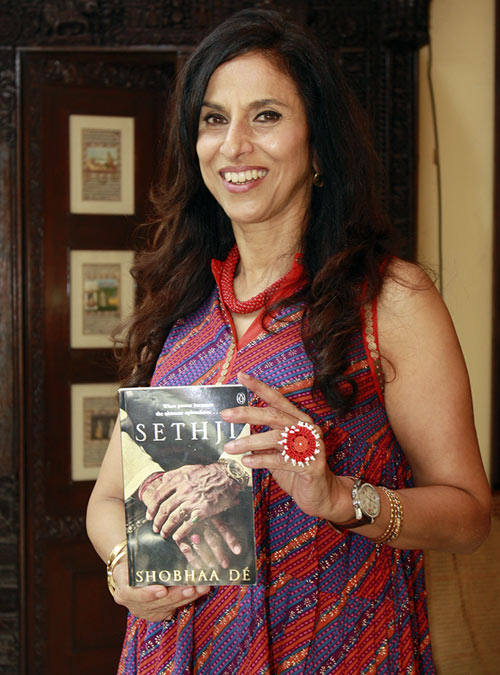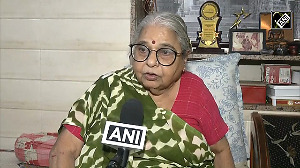 The underlying tone of a call for separate Mumbai city is always seen as a class war and a linguistic war, says Neeta Kolhatkar
The underlying tone of a call for separate Mumbai city is always seen as a class war and a linguistic war, says Neeta Kolhatkar
The recent political furore over celebrity writer Shobhaa De dominated television news channels for a full day, over her tweet, ‘Maharashtra and Mumbai??? Why not? Mumbai has always fancied itself as an independent entity, anyway. This game has countless possibilities.’ This was immediately after the United Progressive Alliance agreed to carve out a separate Telangana state.
Instead of ignoring her statement, it led to widespread condemnations on Twitter and off, as the Shiv Sena protested and shouted slogans outside her house. Maharashtra Navnirman Sena president Raj Thackeray hit below the belt saying that separating the city from the state ‘wasn’t the same as a divorce’. The final say on this matter was by none other than Chief Minister Prithviraj Chavan, who set aside all his work to say, “Her comments are frivolous and should not be taken seriously. Neither Mumbai nor Vidarbha will be separated from Maharashtra,” he said, adding, “Unity is our strength.”
The urgency to give any credence to De’s comment was underplayed with deep political thought. Not wanting to encourage any call for a separate Vidarbha, Chavan promptly announced a special package of Rs 1934.50 crore for the region, which has witnessed widespread devastation of crops and property due to heavy rains. One need not be shocked at the sudden appeasement of Vidarbha, because the minute a separate Telangana decision was announced, demand for a separate Vidarbha gained momentum in the ongoing Maharashtra assembly session.
In fact, just last year, a Vidarbha Joint Action Committee was set up, consisting of members of all political parties and social orgranisations. The one Congressman to spearhead this was Ranjeet Deshmukh, whose son Ashish will in fact sit on a day’s fast at Jantar Mantar on August 5. There have also been reports coming in of protests and rasta rokos from different areas of Vidarbha.
Already Vidarbha has faced extreme drought condition in the last few years and over 53,818 farmers have committed suicide (as per the National Crime Records Bureau). The recent heavy rains in Vidarbha have been no less terrible, claiming 107 lives. Politicians, mainly from the Bharatiya Janata Party, Shiv Sena and even Vidarbha legislators from the Congress have lamented the step-motherly treatment meted out to the region. By and large the Congress-Nationalist Congress Party government is perceived to have favoured Mumbai, Pune and Konkan regions over others.
All through the daylong controversy over De’s comment, one only saw emotional overtones masquerading as reactions. The fact is that Dr Babasaheb Ambedkar had originally envisaged two Telugu-speaking states, three Marathi-speaking states and a large number of Hindi-speaking states. Accordingly, in 1955, a states reorganisation commission was set up that recommended a separate Vidarbha. However, the question of dividing states or letting them remain united has been a sensitive issue, and a violent one at that. One wherein the Congress has often flip-flopped and changed its mind often, whether it be on Telangana or Vidarbha.
Time and again the elite in Mumbai have bemoaned the city’s crumbling infrastructure and not having control over its resources. Often, the minuscule elite that is known to not go out and vote has claimed that Mumbai city needs to be a separate state and not in the clutches of politicians. The fact is that residents feel helpless at the complete indifference shown by the civic authorities, and more so the parties that govern the Mumbai municipal corporation. However, the underlying tone of a call for separate Mumbai city is always seen as a class war and a linguistic war. The truth is that 105 mill workers laid down their lives in 1960, when their peaceful demonstration led by the Samyukta Maharashtra Samiti (the United Maharashtra Committee) was fired upon. This hastened the formation of a unified Maharashtra state on May 1, 1960.
The movement for a unified state was led by Keshavrao Jedhe, SA Dange, Acharya Atre, SM Joshi, Prabodhankar Thackeray, Shahir Amar Shaikh, Senapati Bapat and other leaders along with lakhs of mill-workers, and at that time it was no secret that the Congress wanted a separate Bombay state. While India adopted the European principle of forming states on linguistic lines, the idea to hive off the then Bombay as a separate state, for financial reasons, was supported by the then Congress leaders. Since then the division between the two sides has taken on the hues of a class war.
Communist leaders trashed the idea that Mumbai was created by industrialists, arguing that it was the mill workers who made the city what it was. It was known that the Congress opposed the unification of Mahrashtra. In fact Acharya Atre, in his paper Maratha, criticised Prime Minister Jawaharlal Nehru, Morarji Desai, the then chief minister of Mumbai, and SK Patil, the member of Parliament for supporting the separation of Mumbai from the state.
Often frivolous comments reflect a lack of deep understanding of history. As George Orwell said, ‘The most effective way to destroy people is to deny and obliterate their own understanding of their history.’ The changing contours of Mumbai city have led many to believe that the ones who hold the key to financial capital created the city, when in reality they supported a separate Mumbai state. Meanwhile, the worker that laid down his life and his fellowmen have been driven to the periphery of the city, of its memory, as well of history.









